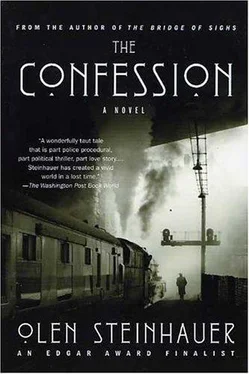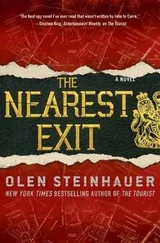Olen Steinhauer - The confession
Здесь есть возможность читать онлайн «Olen Steinhauer - The confession» весь текст электронной книги совершенно бесплатно (целиком полную версию без сокращений). В некоторых случаях можно слушать аудио, скачать через торрент в формате fb2 и присутствует краткое содержание. Жанр: Политический детектив, на английском языке. Описание произведения, (предисловие) а так же отзывы посетителей доступны на портале библиотеки ЛибКат.
- Название:The confession
- Автор:
- Жанр:
- Год:неизвестен
- ISBN:нет данных
- Рейтинг книги:5 / 5. Голосов: 1
-
Избранное:Добавить в избранное
- Отзывы:
-
Ваша оценка:
- 100
- 1
- 2
- 3
- 4
- 5
The confession: краткое содержание, описание и аннотация
Предлагаем к чтению аннотацию, описание, краткое содержание или предисловие (зависит от того, что написал сам автор книги «The confession»). Если вы не нашли необходимую информацию о книге — напишите в комментариях, мы постараемся отыскать её.
The confession — читать онлайн бесплатно полную книгу (весь текст) целиком
Ниже представлен текст книги, разбитый по страницам. Система сохранения места последней прочитанной страницы, позволяет с удобством читать онлайн бесплатно книгу «The confession», без необходимости каждый раз заново искать на чём Вы остановились. Поставьте закладку, и сможете в любой момент перейти на страницу, на которой закончили чтение.
Интервал:
Закладка:
There was nothing to do until Stefan showed up and walked me through the case, so I rolled a fresh sheet into my typewriter, gave the ring on my left pinkie a half turn, and stared at the page. I’d written the book on this, adapting my touch to the stiff T, the rusting carriage return, and its fragile, gray body.
A half hour later, the paper was still blank. I scratched a mosquito bite on my ankle, then typed a few words to get it going. But it went nowhere. I tapped my fingers on the edge of my desk and gazed at the ubiquitous portrait of Prime Minister Mihai-young, a wave of healthy hair, a smile that begged to be trusted.
Finally, Stefan stormed into the room, his satchel banging against the doors and clattering to the floor as he arrived at his desk. He was looking fatter than usual, and his shrapnel limp was stronger today, but he had a pink, lively glow above his sparse beard. “There you are,” he said, out of breath.
We shook hands, a little formally.
“You get my message?”
“Magda wrote it down.”
“Good, good.” He rubbed a hand through his whiskers. He seemed to be deciding something. “What are we waiting for?” He got his satchel again, and I followed him out of the office.
7
I’d known Stefan since childhood. When you know someone that long, the actual circumstances of your introduction disappears. We went to school together, got into trouble together, and lusted after the same girls together. It was a joke, around the time of my marriage, that he’d never forgiven me for seducing Magda, because we’d both stared at her from across the schoolhouse, gauging our prospects. But by the wedding we weren’t boys anymore. It was 1939 and we were preparing to meet the Germans, who had crossed over from Czechoslovakia and were ready to make quick work of us. Stefan was wounded that first week by a mine and sent back home. I survived the whole month and a half of useless fighting, all the way to the defeat in May. But by the time I returned home to Magda, and to the news that my parents had died when an errant bomb fell on their house, I was sick and mentally worthless. I had to begin anew.
I wrote about my condition in the novel, a few sentences about how the act of killing Fascists seemed to take away my humanity, and when the war was over I thought it would never return-I was surprised that those lines made it past the Culture Ministry editors. But the humanity did return, months after the war, with Stefan’s help. He had become a police officer in the occupied Capital, and he continually came out to visit us at Teodor’s house, trying to save me from my self-pity with the offer of a job. It took a lot of prodding, but by 1940 I accepted it, and two years later Agnes was born. Two years after that, I was best man at Stefan’s marriage to Daria Vidra, the first girl who’d ever slept with him. But by the end of the decade they had split up. He’d been alone ever since.
In the car, he adjusted the mirror and went over the details. On Friday morning, a neighbor had smelled gas around the victim’s apartment door and informed the building supervisor, who, when he unlocked the door, was almost knocked unconscious by the fumes. But he made it inside and turned off the stove by reaching over the body of the deceased. “His name’s Josef Maneck.”
“So it’s a suicide?”
Stefan leaned into a sharp swerve around a trio of broom-sellers. “That’s the easy answer, but I’m not sure. He’d been beaten up pretty badly.”
“Any word on that?”
He stopped behind a cart overflowing with yellow squash. The farmer tapped his stick on the tired mare’s rump. “The supervisor could only say that the victim was a drunk. I got the name of his bar.”
“Nothing in the apartment?”
“I went through it once, but didn’t find anything.”
“And the neighbors?”
“Heard nothing, saw nothing. The usual.”
We were in the last hot days of September, and everyone seemed to know this. Women wore uncovered heads and those tight, unignorable skirts that had become fashionable that summer; the men went without jackets. It was as if they were taking this final chance to soak up the sun. I saw a few familiar faces in the bookstore displays, then wondered how Agnes was doing at school. “What now?”
“Let’s hear from the coroner,” he said, “then visit his watering hole.”
He took a few more turns, scratched at his beard, and asked how the writing was coming. I told him the writing wasn’t coming along at all. He didn’t seem fazed. “So did the countryside do its magic for you and Magda?”
I shook my head. “I heard about Leonek’s mother.”
“Heart attack.” He turned into the Unity Medical Complex parking lot. “Happens every day, and she was old enough.” His eyes roamed the cars for a spot. “Leonek’s fallen apart, though. Remember when Sergei was killed?”
1946: Leonek’s longtime partner, with a bullet in the back of his head down by the Tisa.
“Same as he was then,” Stefan said. “He looks like hell, he doesn’t come into work half the time, and he can’t even do the job when he does.” He put on the parking brake, turned off the engine, and looked at me. “That man wears his grief on his sleeve. It’s not pretty.”
He said this with more scorn than I would have expected. In the last years-since his divorce and the more recent death of his own mother-he’d been losing his ability to empathize with misery. I’d noticed this often and once made the mistake of mentioning it to Magda. Her answer: And you can?
In the basement morgue, the new coroner set aside his newspaper. “Markus Feder,” he announced as he shook our hands with his rubber-gloved one. Yuldashev, the previous coroner, had moved back home to Tashkent in July. He’d done it in a hurry, without any announcement, and they replaced him with this redheaded child who delicately pulled back a white sheet covering the body of Josef Maneck.
Fifty-one, very thin, flesh loose over his limbs. There were black welts on his face, around his cheeks and jaw, and his skin was white except where the sun had browned his head and hands. His ears, lips, and the fingernails on his clenched hands were blue. Markus Feder repositioned the head for us to see clearly. “I cleaned the froth and blood off the lips, and we had to change his drawers because of the defecation. I also pushed the tongue back in to get a look inside the mouth. See here,” he said, and pulled open an eyelid. Around the cornea was a field of burst capillaries. “It was the gas, all right. Suicide.”
“And what about these bruises?” I waved a hand at the face.
Markus Feder grimaced. “Somebody hit him, sure, but that was hours before he died.”
“I wonder who,” said Stefan.
“That, Comrade Inspectors, is your job.” He covered the dead man with the sheet.
8
It had no name. Before the war, it had been named after the owner, but he had been shipped off somewhere when his bar was nationalized. Now, it was only CAFE-BAR and, below the sign, on a small white placard, #103. It was the kind of dingy place I would lurk in when I came back from the Front. In these places maimed veterans grumbled into their shot glasses and made menacing noises at anyone who looked whole. For the price of a drink you could learn their stories or see their scars. I had no scars to show but my gaunt body, though I grumbled too.
Stefan wrinkled his nose. There were a couple men in the back corner, hunched in the darkness over their tables, and we could smell them from the door. The bartender looked at us through round glasses, and said, “What, then?”
“Not much of place you’re running here,” said Stefan.
“If you’ve come to complain-”
Читать дальшеИнтервал:
Закладка:
Похожие книги на «The confession»
Представляем Вашему вниманию похожие книги на «The confession» списком для выбора. Мы отобрали схожую по названию и смыслу литературу в надежде предоставить читателям больше вариантов отыскать новые, интересные, ещё непрочитанные произведения.
Обсуждение, отзывы о книге «The confession» и просто собственные мнения читателей. Оставьте ваши комментарии, напишите, что Вы думаете о произведении, его смысле или главных героях. Укажите что конкретно понравилось, а что нет, и почему Вы так считаете.












